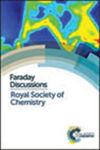Spiers Memorial Lecture: How to do impactful research in artificial intelligence for chemistry and materials science
IF 3.4
3区 化学
Q2 Chemistry
引用次数: 0
Abstract
Machine learning has been pervasively touching many fields of science. Chemistry and materials science are no exception. While machine learning has been making a great impact, it is still not reaching its full potential or maturity. In this perspective, we first outline current applications across a diversity of problems in chemistry. Then, we discuss how machine learning researchers view and approach problems in the field. Finally, we provide our considerations for maximizing impact when researching machine learning for chemistry.

如何在化学和材料科学领域开展有影响力的人工智能研究。
机器学习已经渗透到许多科学领域。化学和材料科学也不例外。虽然机器学习已经产生了巨大的影响,但其潜力和成熟度仍未充分发挥出来。在本视角中,我们首先概述了当前的普遍应用。然后,我们讨论机器学习研究人员如何看待和处理该领域的问题。最后,我们提出了在研究化学机器学习时如何最大限度地发挥其影响力的注意事项。
本文章由计算机程序翻译,如有差异,请以英文原文为准。
求助全文
约1分钟内获得全文
求助全文
来源期刊

Faraday Discussions
CHEMISTRY, PHYSICAL-
CiteScore
4.90
自引率
0.00%
发文量
259
审稿时长
2.8 months
期刊介绍:
Discussion summary and research papers from discussion meetings that focus on rapidly developing areas of physical chemistry and its interfaces
 求助内容:
求助内容: 应助结果提醒方式:
应助结果提醒方式:


